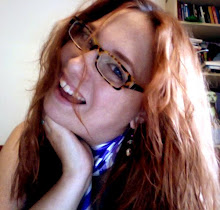I have a naughty new obsession. As Madeleine over at The Buried Editor will confirm, banned books are bloody addictive. It's not so much that I'm reading them right now, since I have a stack of ARCs that could kill a man if its center of gravity were disturbed. It's that I'm reading about them. Constantly. I set up a display at work of some of our most popular and intriguing banned and challenged books. The display includes classics like In the Night Kitchen, Huckleberry Finn, Alice in Wonderland, and James and the Giant Peach. It has recent favorites like Walter the Farting Dog, Captain Underpants, Looking for Alaska, and Harry Potter. So many books have been banned or challenged it simply blows your mind.
Naturally I'm a fan of freedom of expression. But what a lot of us don't consider here in the states, or in most western countries, is intellectual freedom. Sure, you may be able to go to the store and buy any of these banned books. So what if a bunch of yahoos want to ban a book from their school library, how does that effect you as long as they are available for purchase? But here's the thing about that: banning books from libraries makes freedom of intellect a privilege saved for those with enough money to buy all the books they want to read. And I think that's wrong.
Sure, maybe we shouldn't put Francesca Lia Block's sexed-up fairystories in the hands of ten-ten-year olds. But I don't think the government should say what I, were I that ten year old (or eight-year-old or twelve-year-old), should read. That's between me and my family. So while elementary and middle school libraries should perhaps be monitored, high school libraries and classrooms should have significant freedom. And, for the love of all things literary, keep your matches out of our public libraries.
The public library system is one of the greatest things about our country. Sure, the Austin Public Library has a price on my head right now ($17.48, I think). But if I return my books on time, it is completely free for me to walk in there and read whatever I want, even if my neighbor's cousin's mom thinks Where's Waldo has a topless chick in it somewhere.
The point is, young minds should be protected by parents. That said, I think parents should keep one thing in mind when they're getting ready to challenge a book: human nature. Your child will read the "bad" book behind your back; subsequently he will not be able to talk to you about it. My uninformed, inexperienced, parenting tip: if you think something in a book your kid wants to read could confuse, frighten, or corrupt him, consider reading it WITH him. Keep the discussion open - that way you can talk to him about the sex, drugs, violence, or moral quandries of the characters. That way when the inevitable happens, you can still be involved.
On that note, here is a list of some of my favorite banned & challeneged books:
Are You There God? It's Me Margaret by Judy Blume - One of the most challenged books of all time due to frank discussions of adolescent sexuality.
Anne Frank: The Diary of a Young Girl by Anne Frank - Challenged in Wise County, Va. (1982) due to "sexually offensive" passages. Four members of the Alabama State Textbook Committee (1983) called for the rejection of this book because it is a "real downer."
And Tango Makes Three by Justin Richardson & Peter Parnell - Unsuccessfully challenged in Lodi, CA public libraries. (2007) Reasons: anti-ethnic, sexism, homosexuality, anti-family, religious viewpoint, unsuited to age group
The Lorax by Dr. Seuss - Challenged in the Laytonville, Calif. Unified School District (1989) because it "criminalizes the foresting industry."
A Wrinkle in Time by Madeleine L'Engle - Challenged at the Polk City, Fla. Elementary School (1985) by a parent who believed that the story promotes witchcraft, crystal balls, and demons.
I Know Why the Caged Bird Sings by Maya Angelou - This book is frequently challenged because of Angelou's descriptions of her rape as a child.
(ps, I got my info on the bannings from forbiddenlibrary.com and ALA.org - thay have lots more information about banned books than me, plus tools and ideas for banned book week, too!)
Hello world!
2 years ago


Interesting.
ReplyDeleteConsider that a former ALA Councilor said, "It also highlights the thing we know about Banned Books Week that we don't talk about much — the bulk of these books are challenged by parents for being age-inappropriate for children. While I think this is still a formidable thing for librarians to deal with, it's totally different from people trying to block a book from being sold at all."
What do you think of that?
This comment has been removed by the author.
ReplyDeleteI think that makes sense. I think it's particularly rough because what one parent considers age-appropriate is vastly different from what others consider age-appropriate. But I am particularly glad that freedom of speech pretty much prevents a book being banned from the market. I hope.
ReplyDeleteSo I think it IS different, but not really better. I still think that intellectual freedom is important for kids, and that the age-appropriate thing can mostly be solved by parents being more active in their kids' education.
Great!
ReplyDeleteThen keep in mind, since you linked to the ALA as a source for information, that the ALA's views on "banned books" might not exactly match your own or be connected to reality in any way. After all, no book has been banned in the USA for many decades.
See, for example, "Hogwash is Happening, by Thomas Sowell, Washington Times, 3 October 1997.